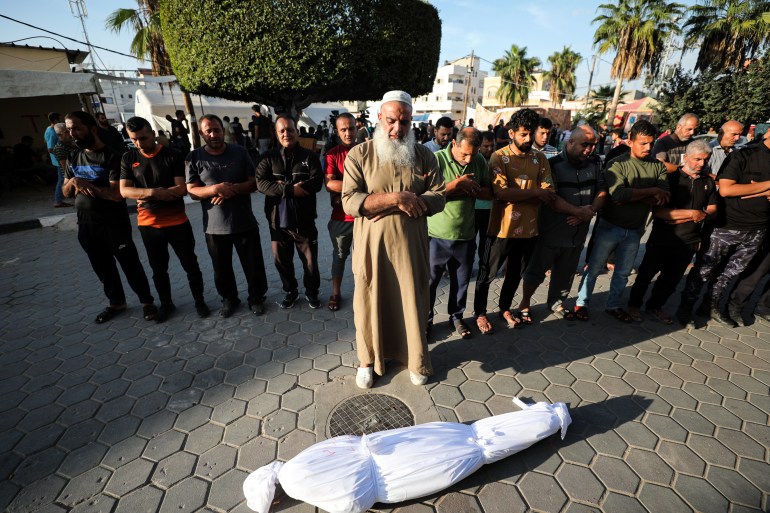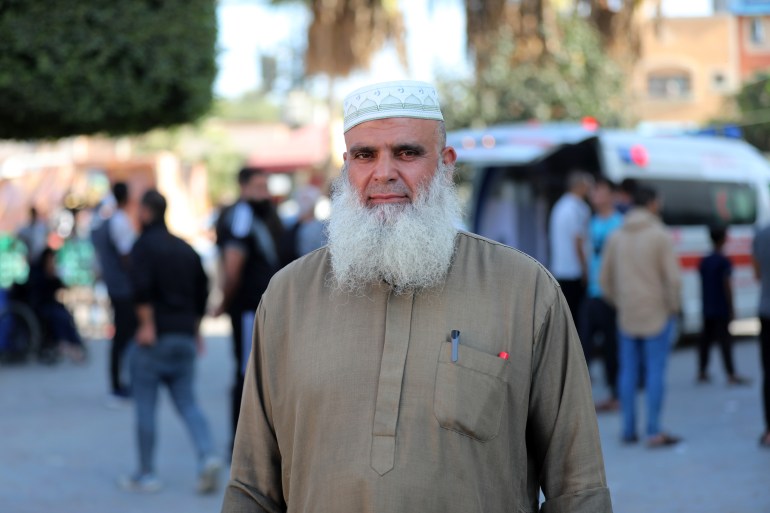Abu Saher al-Maghari: The man who shrouds the dead in Gaza
Abu Saher al-Maghari has shrouded hundreds of bodies of people killed in Israeli attacks on Palestinians in the Gaza Strip.

Deir el-Balah, Gaza Strip – Inside a small narrow room with white tiles, one man works diligently every day, standing for long hours over a raised platform with white cloths hanging from the railings.
For more than a month, Abu Saher al-Maghari has stood over this platform, gently tending to the bodies that have been arriving at Al-Aqsa Martyrs Hospital in the central Gaza Strip.
Keep reading
list of 3 itemsMore children’s deaths in Gaza in 3 weeks than annual total since 2019: NGO
Photos: More Israeli attacks, more death and destruction in Gaza
The 53-year-old, who has a quiet air, has been shrouding the dead for 15 years at this hospital. But since the Israeli offensive on the Gaza Strip began on October 7, al-Maghari has witnessed a huge influx of bodies, many of them mutilated.
When asked about the bodies he has seen, al-Maghari began crying.
“I have never experienced such a difficult time in my life,” al-Maghari said, wiping tears from his white beard.
“Throughout my years of work, I used to shroud from 30 to a maximum of 50 natural deaths daily, and in the case of previous Israeli military escalations, the number might reach about 60,” he recalled.
Now, he shrouds about 100 bodies, and sometimes that number can rise up to 200, depending on the intensity of the bombing and the areas targeted by Israeli warplanes.
“Most of the bodies arrive at the hospital in very bad condition,” al-Maghari said. “Torn limbs, severe bruises and deep wounds all over the body. I have never gone through anything like this before.”
‘My heart breaks over children’s torn limbs’
The largest number of victims he receives are of children and women, and the nature of their injuries and wounds is unfamiliar to him.
“What saddens me most is shrouding children,” al-Maghari said. “My heart breaks as I collect the children’s torn limbs and put them in one shroud. What have they done?”
For the past 34 days, more than 10,800 Palestinians have been killed in Israeli attacks on the Gaza Strip.
This number includes more than 4,400 children and 2,900 women, resulting in the United Nations secretary-general describing Gaza as a “graveyard” for children.
According to Mohammed al-Hajj, the hospital’s spokesman, the bodies of at least 2,476 Palestinians have arrived at Al-Aqsa Martyrs Hospital since the beginning of the war on Gaza.

The hospital had a 200-bed capacity for patients before the war but was forced to add more due to the more than 5,300 wounded who have arrived at the hospital over the past month, al-Hajj said.
“We expanded the bed capacity to 431 beds, and this put us in front of a dilemma and challenge in terms of serving this expansion,” he said.
Al-Maghari, who sometimes works with an assistant, has shrouded the bodies that have arrived at the hospital.
“I start my day shrouding the dead and killed from six in the morning until eight in the evening without stopping,” he told Al Jazeera after stealing a moment for the afternoon prayer.
Some of the bodies that arrive are already in an advanced state of decomposition with bones visible and an unbearable smell after lying for days under the rubble of bombed buildings.
Other bodies arrive in torn pieces, some burned beyond recognition, al-Mahgari said. This is something new, he said. The injuries are so unfamiliar to him that he wonders if the nature of the missiles and explosives used in the Israeli attacks are different from what has come before.
Moments of farewell – heartbreaking and cruel
Despite the daily horrors, al-Maghari goes about his job as always. He said it is his firm belief that family members must have the right to say goodbye to their loved ones.
“My mission presents me with a great challenge,” he said. “The parents outside are going crazy in their grief, screaming and crying for their child. So I try to be as compassionate as I can be and work on making the bodies look presentable so that they can say goodbye.”
Al-Maghari focuses on the general appearance of the dead, wiping away the blood and dust, then writing their names on their shrouds.
Surviving family members are especially shocked to see the torn body parts of their loved ones, which he places carefully in one shroud.
“These moments of the final farewell are always heartbreaking and cruel,” he said. “Sometimes I receive bodies that have no features, due to explosive shrapnel. Here, I tie the shroud shut to spare the family members from remembering their loved ones in such a graphic state.”
Often, he has to shroud bodies inside ambulances that arrive at the hospital because it is simply too difficult to carry the dismembered body parts to his workspace for washing and shrouding.
Al-Maghari said the number of bodies arriving at Al-Aqsa Martyrs Hospital doubled after the mass displacement of Gaza City residents to the cities in the southern Gaza Strip, which increased after October 13.
“Every day, women, men and children, all of them civilians, are killed in Israeli attacks on their homes or public places or while travelling to the south,” he said.

‘No time to cry’
Al-Maghari believes that discussing the toll this work is taking on his mental health is a “luxury” in light of the catastrophic conditions the health sector is enduring.
“Dealing with this number of torn and burned bodies, most of them children, requires a high level of psychological toughness that not every human being possesses,” he said. “I face a real test every day. There is no time to cry or break down at the same time, but we are only human.”
Al-Maghari’s work in these dangerous conditions does not leave him the opportunity to think about his family, who lives in the Nuseirat refugee camp in the centre of Gaza City.
“Like all parents, I fear for my family, but I can barely communicate with them or be reassured,” the father of five children said.
“When I return home, I am unable to talk to my family at all,” he added. “All I ask of them is to leave me alone, even if they miss me. It’s beyond my control.”
As the Israeli bombardment and ground offensive continues, he knows it is possible that Israeli strikes could hit closer to home.
“I often imagine that my children could be among the victims that I will shroud at any moment,” al-Maghari said. “Everyone is being targeted, without exception.”